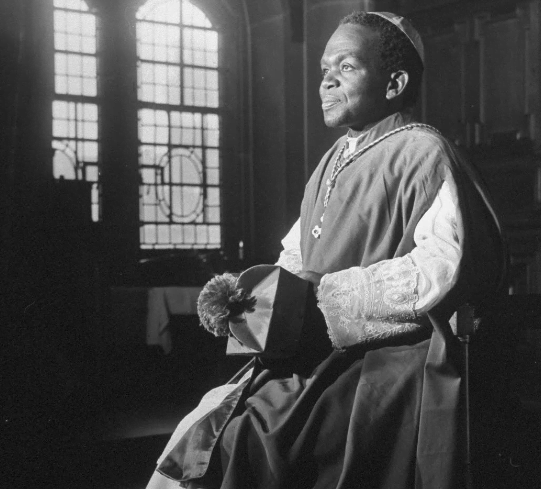Joseph Nakabaale Kiwanuka was the first native African to be ordained a Catholic bishop in modern times. He was born at Nakirebe in Mawokota county, Uganda, the child of Catholic parents, Victoro Katumba Munduekanika of the monkey clan and Felicitas Nankya Ssabawebwa Namukasa of the lungfish clan.
Joseph was baptized at Rubaga, Kampala, on June 25, 1899. He received his primary education at Mitala Maria from 1910 to 1914, when he entered Bukalasa junior seminary.
After studying philosophy and theology at Katigondo major seminary, he was ordained priest at Villa Maria on May 26, 1929. In his fourth year at Katigondo, Kiwanuka felt the call to join the Society of Missionaries of Africa (White Fathers).
Bishop Henri Streicher, his ordinary, opposed the move. However, Fr. Voillard, the Superior General of the society, who visited the seminary in 1928, agreed to admit Kiwanuka after ordination to the priesthood.
Shortly after his ordination, Kiwanuka received his call to the novitiate of the Missionaries of Africa on July 15, 1929. However, Bishop Streicher again intervened, sending the young priest to Rome for further studies.
Kiwanuka lodged at the house of the Missionaries of Africa on via Trenta Aprile and attended the Pontifical Angelicum University, where he took a licentiate and doctorate in Canon Law. The subject of his doctoral dissertation, which he defended in 1932, was the marriage contract. After visiting France and England, Kiwanuka arrived in Algiers to make his novitiate with the Missionaries of Africa on October 8, 1932.
He completed his novitiate on October 12, 1933 and, after his return to Uganda, pronounced the missionary oath at Entebbe on October 12, 1934. Meanwhile, Bishop Streicher’s diocese had been divided into the vicariates of Masaka and Rubaga, on his retirement in 1933.
After pastoral appointments at Bikira and Bujuni, Kiwanuka came to Katigondo seminary, where he joined the teaching staff.
On June 1, 1939 he received news of his appointment as Vicar Apostolic of Masaka. Joseph Kiwanuka was consecrated bishop in St. Peter’s Basilica, Rome, by Pope Pius XII on October 29, 1939, assisted by Archbishop Henri Streicher.
Kiwanuka came back to his diocese soon after the start of World War II. In August 1940, the new bishop moved his diocesan headquarters from Villa Maria to Kitovu near Masaka town. In 1947, Kiwanuka played an important role at the General Chapter of the Missionaries of Africa in Algiers by championing the international character of missionary personnel in Uganda and resisting compliance with the desire of the British colonial office to admit only British, Commonwealth and English speaking missionaries to Uganda.
In January 1961 Joseph Kiwanuka was appointed Archbishop of Rubaga, on the retirement of Archbishop Joseph Cabana, and in October of the following year played a prominent role in the celebrations accompanying the attainment of political independence in Uganda.
Immediately afterwards, Kiwanuka came to Rome to attend the sessions of the Second Vatican Council 1962 to 1965. During the third session of the Council, Bishop Kiwanuka assisted Pope Paul VI at the canonization of the twenty-two Catholic Martyrs of Uganda on October 18, 1964. In 1965 Obote’s government in Uganda underwent a political crisis, and Kiwanuka responded by publishing an inspiring pastoral letter on political leadership and democratic maturity.
This was Kiwanuka’s final legacy, for he died suddenly on February 22, 1966, the day before Milton Obote assumed unconstitutional powers. He is buried in Rubaga Cathedral.
The leadership of Archbishop Kiwanuka opened the door to the full development of the Catholic Church in Africa, which is now entirely in African hands.
Aylward Shorter M.Afr.
